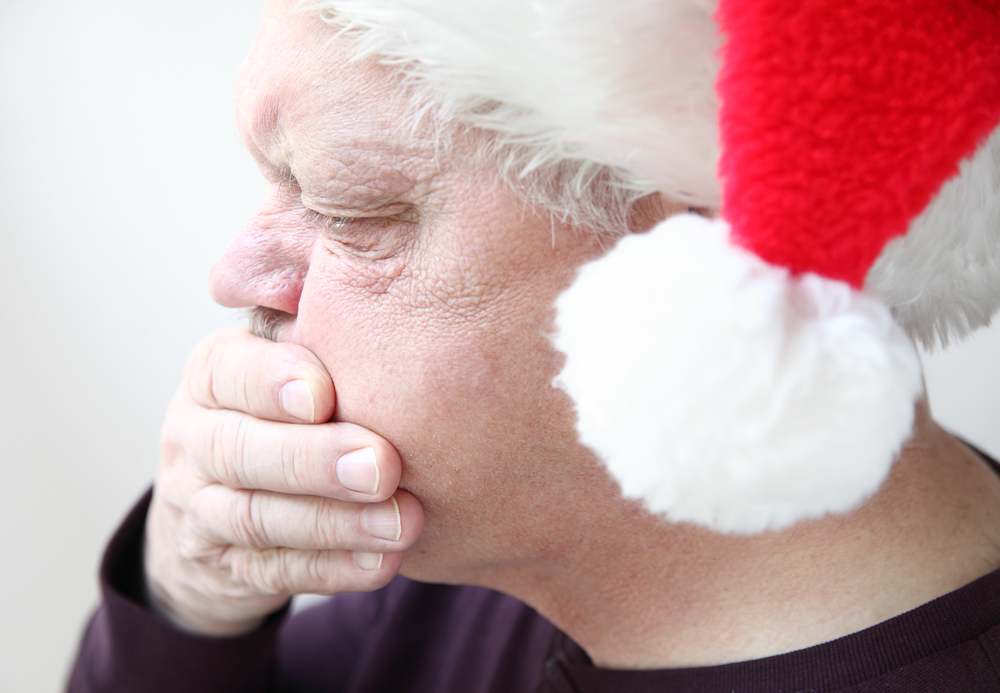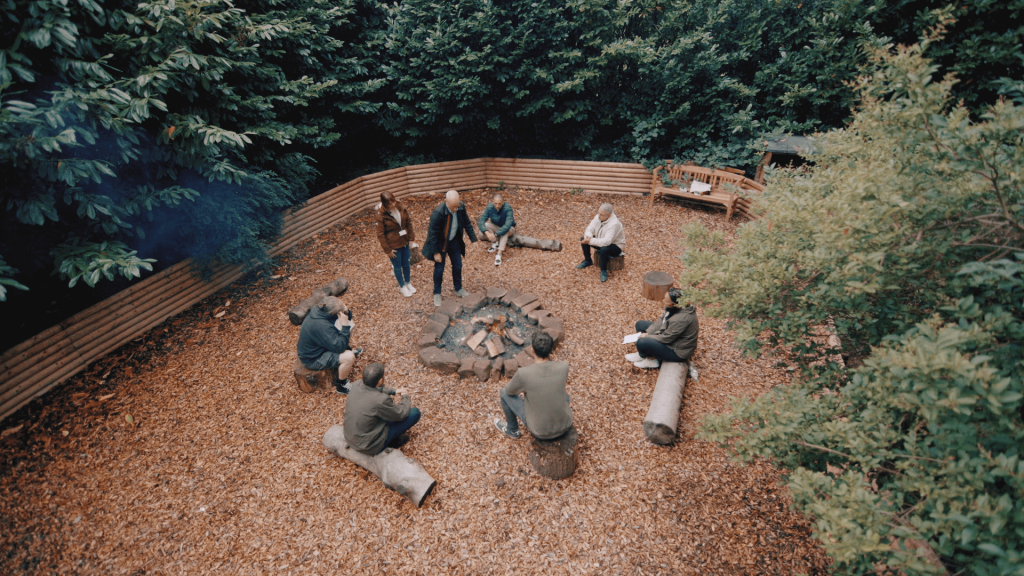What’s included?
- Introduction
- Common triggers for relapse at Christmas
- How to stay sober at Christmas
- Avoiding a drug relapse at Christmas
- How can Delamere help prevent a relapse at Christmas
Christmas is a special time of year for most families, but for people recovering from addiction it can be fraught with stress. Suddenly, the same demons you’re trying to suppress become everyone else’s accepted norm. Friends who may usually be a positive influence let their guards down and your usual support network can start to break down.
It’s also a time when the usual coping mechanisms, such as eating at set mealtimes or getting an early night, are disturbed. There’s either an anxiety-inducing social event to navigate or too much time sitting around with nothing to do but indulge. So, how can you prevent a return to active addiction at Christmas?
Whether you are trying to stay sober, avoid taking drugs or cope with other compulsive behaviour disorders, such as shopping addiction, there are strategies you can adopt to help. Here, the experts at Delamere wellness retreat in Cheshire share their top tips for getting through the holiday season if you’re trying to prevent an addiction relapse this Christmas.

Want advice for preventing a relapse at Christmas? Speak to Delamere
Common triggers for a relapse at Christmas
Behind the fairy lights and festive glow, many people find Christmas incredibly challenging. For someone in active recovery, there are multiple stressors, such as certain places or people, that make it especially difficult. Here are some of the most common triggers that make it hard for people trying to prevent an addiction relapse at Christmas:
High Levels of Stress
Psychologists agree that stress is a key factor in addiction relapse and treatment failure. Often alcohol and drug addiction is the result of a stressful life event or past traumatic experience. A person in recovery will have learnt tools to manage stressful situations in everyday life that may trigger their addictive behaviour. But, at Christmas, stress levels are often higher than usual. Whether it’s worrying about financial pressures, fretting about seeing relatives or buckling under the pressure of high expectations. All of these things can contribute to an addiction relapse.
Influx of social events
The number of opportunities to drink or take drugs skyrockets at Christmas. While you might initially feel confident going to a festive gathering, it can be incredibly hard to resist temptation when everyone is in the party mood. Research from Drinkaware shows alcohol is also engrained in work culture at Christmas, with workers feeling more pressure to drink. Social anxiety can present a problem for people in recovery who feel they need substances in order to face social situations.
Friends and family
Christmas is laced with obligation. Enforced gatherings with family and friends can be triggering for someone in recovery. It’s not only hard for you to see people who are a bad influence on your good intentions; certain relatives can trigger your drug or alcohol addiction if they hold any resentment towards you. At this time of year it can be impossible to avoid situations which may test your recovery.
Loneliness and boredom
Christmas is often a time for reflection. Given enough time to sit around and contemplate, someone in recovery may start to reminisce about better times when drink or drugs made them feel happy and loved. If you’ve been ostracised and find yourself alone this can also lead to a temptation to relapse to relieve the boredom. With all of these potential dangers, it’s important to prepare ahead of time and plan some strategies if you find yourself heading for an addiction relapse.
How to stay sober at Christmas
Drinks after work. Festive long lunches. Late-night parties. Alcohol is unavoidable at Christmas. Even people who aren’t recovering alcoholics find it overwhelming. More than one in ten UK drinkers admit they avoid social occasions during the festive season because of the pressure to drink. Aside from completely swerving anywhere that alcohol is consumed, what can you do to avoid an addiction relapse at Christmas? Here are some top tips…
Find a healthy alternative
It can help to fill your days with activities that are good for your body and mind that don’t involve alcohol. Suggest a walk instead of a trip to the pub or choose venues that have more on offer than just the bar, such as pool tables or crazy golf. Read self-help books and connect with support groups online to keep yourself focused.
Throw your own party
Take control of what’s in the house and what gets served at dinner. If you’re the host, you can throw your own party and politely ask people not to bring alcohol. It also means you’ll be busy and distracted in the kitchen, rather than having too much time to sit around and stress. Invite a sober friend who can be there to support you.
Start a new tradition
Who says you have to pour brandy on the Christmas pudding or leave drinks out for Santa? Part of the challenge for recovering alcoholics is the long list of traditions that lead to temptation. If you have children, focus on activities you can do together that don’t involve alcohol and create your own family traditions. Santa is a big fan of milk and cookies!
Avoiding a drug relapse at Christmas
If you’ve been through rehab for drug addiction you’ve no doubt learnt lots of tools to help you stay on track. During the Christmas holidays it’s important to be prepared for the challenges and focus all your efforts on your continued recovery.
Do a risk assessment
Many people have at least a week off at Christmas and this time is usually packed with events. Make a list of where you need to be and rate it on a scale of low to high risk. If there is a significant chance of you taking drugs or being surrounded by people who are under the influence, make other plans.
Remember your goals
If you find yourself tempted to take drugs, think about what your life could be without them. Remind yourself of the commitment you made and the people who are relying on your abstinence. It may help to revisit journals you wrote during your time in rehab to help you focus on the future.
Use your support system
While meeting up with friends and family also brings its challenges, it’s important not to withdraw yourself. Isolation and boredom will only give you more opportunities to dwell on the past. Contact people who have been on the rehab journey with you or confide in a close friend who can support you throughout the festive period.
How can Delamere help prevent a relapse at Christmas
We understand that Christmas is one of your most challenging times and carries a high risk of relapse. Our purpose-built wellness retreat in Cheshire helps people before, during and after the festive period to remain in active recovery. Whether you need short-term therapy or a longer residential stay, we are here for you.
Our holistic therapists use a range of techniques to keep you focused. You can share your fears in one-to-one counselling and build a support network through our group therapy sessions. We will teach you coping mechanisms to overcome your triggers over Christmas and beyond. From your own ensuite room in tranquil surroundings you’ll also be able to get back into the healthy habits that have served you well so far.

We want everyone who has committed to giving up alcohol or drugs to remain in active recovery for life. That’s why our residential rehab programmes come with a ‘future-proof’ plan and 12 months of aftercare support. Together, we can help you overcome the temptation of alcohol or drugs, start to heal again and grow beyond addiction for good.
If you are concerned about having an addiction relapse at Christmas, call us confidentially to speak to a member of the team today. Contact Delamere






